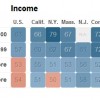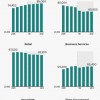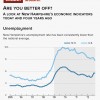Background
New Hampshire’s 2012 election ballot will include the presidential and gubernatorial contests, as well as races for the state’s two congressional seats.
Voters will also be asked to consider two proposed constitutional amendments, along with scores of candidates for state Senate and House seats.
In the run-up to Nov. 6, we’ll be updating this guide to the 2012 election with more information on the issues, candidates and contests.
Candidates:
President of the United States
Virgil Goode (Constitution)
Gary Johnson (Libertarian)
Barack Obama (Democratic)
Mitt Romney (Republican)
U.S. House of Representatives
District 1
Frank C. Guinta (Republican)
Brendan Kelly (Libertarian)
Carol Shea-Porter (Democratic)
District 2
Charles F. Bass (Republican)
Hardy Macia (Libertarian)
Ann McLane Kuster (Democratic)
Governor
John J. Babiarz (Libertarian)
Maggie Hassan (Democratic)
Ovide Lamontagne (Republican)
Executive Council (Click here for a map of Executive Council districts.)
District 1
Raymond S. Burton (Republican)
Beth Funicella (Democratic)
Howard L. Wilson (Libertarian)
District 2
Michael J. Tierney (Republican)
Colin Van Ostern (Democratic)
District 3
Michael J. Baldassarre (Libertarian)
Bill Duncan (Democratic)
Christopher Sununu (Republican)
District 4
Kenneth E. Blevens (Libertarian)
Robert Burns (Republican)
Christopher Pappas (Democratic)
District 5
Debora B. Pignatelli (Democratic)
David K. Wheeler (Republican)
CONSTITUTIONAL AMENDMENTS:
Earlier this year, New Hampshire lawmakers voted to place two constitutional amendments on the Nov. 6 ballot. Voters must approve the proposed amendments by a 2/3 vote in order for them to pass.
Question No. 1 — Explicitly forbids the Legislature from imposing any new taxes or fees on personal income.
Are you in favor of amending Part 2, Article 5-b of the New Hampshire Constitution by adding Article 5-c?:
Notwithstanding any general or special provision of this constitution, the general court shall not have the power or authority to impose and levy any assessment, rate, or tax upon income earned by any natural person; however, nothing in this Article shall be construed to prohibit any tax in effect January 1, 2012, or adjustment to the rate of such a tax.
A YES vote means you approve amending the state constitution to forbid an income tax.
A NO vote means you reject the proposed amendment.
Background:
According to the New Hampshire Department of Revenue, New Hampshire “does not have a general sales tax or an income tax on an individual’s reported W-2 wages.”
New Hampshire is the only state in the Northeast that does not tax personal income. Other states that do not levy an income tax on residents are Alaska, Florida, Nevada, South Dakota, Tennessee, Texas, Washington and Wyoming.
The New Hampshire House of Representatives voted 257-101 to refer the amendment to the ballot on Jan. 18, 2012. The measure was passed by the New Hampshire State Senate by a 19-4 vote.
What supporters say:
The lack of both an income tax and a sales tax gives New Hampshire a competitive advantage over other states that impose such taxes to fund government services. The amendment would enshrine the “New Hampshire Advantage” in the state’s constitution and ensure that future legislatures do not impose an income tax in response to short-term economic needs or political whims.
What opponents say:
The measure would tie the hands of future policymakers, who would be required to pass another constitutional amendment before levying an income tax to increase revenue. New Hampshire already relies heavily on property taxes to fund government services. Prohibiting a tax on personal income could lead to higher property taxes, as well as increases in other state and local taxes that have a greater impact lower-income residents.
Question No. 2 — Gives lawmakers “concurrent power” with the Chief Justice of the New Hampshire Supreme Court to regulate the administration of the courts.
Are you in favor of amending Part 2, Article 73-a of the New Hampshire Constitution?:
The chief justice of the supreme court shall be the administrative head of all the courts. The chief justice shall, with the concurrence of a majority of the supreme court justices, make rules governing the administration of all courts in the state and the practice and procedure to be followed in all such courts. The rules so promulgated shall have the force and effect of law. The legislature shall have a concurrent power to regulate the same matters by statute. In the event of a conflict between a statute and a court rule, the statute, if not otherwise contrary to this constitution, shall prevail over the rule.
A YES vote means you approve giving legislators “concurrent” power” with the Chief Justice to make rules governing New Hampshire courts.
A NO vote means you reject the proposed amendment.
Background:
Part 2, article 73-a of the New Hampshire constitution, which authorizes the Supreme Court to “make rules governing the administration of all courts in the state and practice and procedure to be followed in all such courts,” dates back to 1978.
Constitutional amendments to give legislators a greater role in rule-making in the courts have been rejected by voters twice — in 2002 and 2004. Lawmakers tried in 2001, as well, but failed to gather enough votes to place the amendment on the ballot.
The New Hampshire House of Representatives passed the current proposed amendment by a 242-96 vote; the senate subsequently approved it, 19-5.
What supporters say:
The 1978 amendment that removed the legislatures policy-making authority over the courts was an overreach. For most of New Hampshire’s history, the people, as well as the legislative and judicial branches of government, have recognized that lawmakers have a legitimate role in determining how the state’s courts should be administered.
The amendment would not give the legislature authority to interfere with judicial decisions or dictate how judges should rule, but would restore public oversight of practices and procedures that have public-policy implications.
What opponents say:
A political branch of government, the General Court, would be permitted to impose its will on another, an independent judiciary, in violation of the separation of powers, a fundamental principle of constitutional democracy.
Part 1, Article 37 of the New Hampshire Constitution states that the three branches of state government “ought to be kept as separate from, and independent of, each other, as the nature of a free government will admit….”
According to the National Center for State Courts, no other state gives the legislature constitutional authority to determine administration of the courts.
The General Court also approved placing the following question on the ballot:
Shall there be a convention to amend or revise the constitution?
Part 2, Article 100 of the New Hampshire Constitution calls for voters to weigh in every 10 years on whether to have a convention. A majority of voters is required to convene a convention.
A YES vote would means you approve creating a convention to revise or amend the state constitution.
A NO vote means you reject the creation of a constitutional convention.
State Senate (Click here for a map of Senate districts.)
District 1
Debi Warner (Republican)
Jeff Woodburn (Democratic)
District 2
Jeanie Forrester (Republican)
Bob Lamb (Democratic)
District 3
Jeff Ballard (Democratic)
Jeb Bradley (Republican)
District 4
David Watters (Democratic)
Phyllis Woods (Republican)
District 5
Joe Osgood (Republican)
David Pierce (Democratic)
District 6
Sam Cataldo (Republican)
Rich Leonard (Democratic)
District 7
Andrew Hosmer (Democratic)
Joshua Youssef (Republican)
District 8
Bob Odell (Republican)
Ckristopher Wallenstein (Democratic)
District 9
Lee Nyquist (Democratic)
Andy Sanborn (Republican)
District 10
Dick Foote (Republican)
Molly Kelly (Democratic)
District 11
Peter Bragdon (Republican)
District 12
Peggy Gilmour (Democratic)
Jim Luther (Republican)
District 13
Joe Krasucki (Republican)
Bette Lasky (Democratic)
District 14
Sharon Carson (Republican)
Richard Kahn (Libertarian)
Katherine Messner (Democratic)
District 15
Lydia Harman (Republican)
Sylvia Larsen (Democratic)
District 16
David Boutin (Republican)
Kathleen Kelley (Democratic)
Rich Tomasso (Libertarian)
District 17
Nancy Fraher (Democratic)
John Reagan (Republican)
District 18
Gail Barry (Republican)
Donna Soucy (Democratic)
District 19
Jim Rausch (Republican)
Chris Reisdorf (Democratic)
District 20
Lou D’Allesandro (Democratic)
Phil Greazzo (Republican)
District 21
Martha Fuller Clark (Democratic)
Peter McDonald (Republican)
District 22
Victoria Czaia (Democratic)
Chuck Morse (Republican)
District 23
Carol Croteau (Democratic)
Russell Prescott (Republican)
District 24
Bev Hollingworth (Democratic)
Nancy Stiles (Republican)
State House
Click here for a map of New Hampshire’s 204 House districts, then click on your district number or enter your town name or zip code for a list of candidates.








